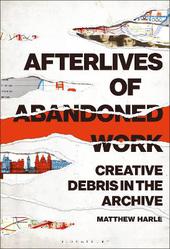
|
Afterlives of Abandoned Work: Creative Debris in the Archive
Hardback
Main Details
| Title |
Afterlives of Abandoned Work: Creative Debris in the Archive
|
| Authors and Contributors |
By (author) Dr. Matthew Harle
|
| Physical Properties |
| Format:Hardback | | Pages:264 | | Dimensions(mm): Height 229,Width 152 |
|
| Category/Genre | Creative writing and creative writing guides
Literary theory
Philosophy - aesthetics |
|---|
| ISBN/Barcode |
9781501339424
|
| Classifications | Dewey:808.02 |
|---|
| Audience | | Tertiary Education (US: College) | |
|---|
| Illustrations |
43 bw illus
|
|
Publishing Details |
| Publisher |
Bloomsbury Publishing Plc
|
| Imprint |
Bloomsbury Academic USA
|
| Publication Date |
27 December 2018 |
| Publication Country |
United States
|
Description
Afterlives of Abandoned Work considers the relevance of unfinished projects to literary history and criticism, looking beyond famous posthumous work to investigate the abandoned everyday, from scrapped plans and rejected ideas to half-written novels or unfinished artistic works. It traces how the reading of abandoned creative endeavor-whether arriving in the form of a rejection letter, a disagreement with a collaborator, or the simple act of walking away from one's desk-can change the way we think about cultural production, the creative process, and the intellectual construction of everyday life. Over five distinct journeys through a variety of archives, from major research libraries to the unique collections of individual enthusiasts, Matthew Harle draws surprising connections between literary studies, media studies, and visual arts, exploring unfinished projects from Thomas Pynchon, Muriel Spark, B.S. Johnson, Harold Pinter, and others. Rooted in literary criticism, Afterlives of Abandoned Work reads unbuilt buildings, unfilmed screenplays, and unpublished novels and radio sketches as forms of text that can help us consider the enduring fragmentation and anecdotal construction of cultural form, as well as expand literary criticism's approach to the archive.
Author Biography
Matthew Harle is a writer, archive curator and Postdoctoral Research Fellow at the Barbican Centre, UK. His writing has appeared in a number of publications, such as Sight & Sound, Screen, CITY and Cineaste, and he is the co-editor of Of Mud and Flame: A Penda's Fen Sourcebook (2018).
ReviewsOne of the foundational manoeuvres of the critical historian of culture is to turn finished works into unfinished ones. Matthew Harle has a head's start here, and he capitalises on it brilliantly revealing the unrealised, the unmade and the abandoned as the ghostly DNA of the cultural sphere. * Ben Highmore, Professor of Cultural Studies, University of Sussex, UK * A glorious typology of the abandoned, failed and unfinished. Matthew Harle enthusiastically traces entropic utopias, ill-advised transport schemes, unraveled cinematic collaborations and unrealised literary projects in a compelling account of the enemies of promise that haunt fallible archives. It is a book that celebrates creative failure and thoughtfully explores the material spaces of incompletion. In a tour de force of intertextuality, it juxtaposes the infinite potential of the unfinished against the mundane inadequacies of the archive. Full of poignant foreclosures, this is a subtle, funny and excitingly original glimpse into the realms of arrested achievement. * Barry Curtis, Tutor in Critical and Historical Studies, Royal College of Art, UK * Most literary historians discuss abandoned art in doleful, pitying terms. Not Matthew Harle: he sees 'failure' as fertile. In this delightful and whip-smart cultural travelogue, he drifts across the 20th century and the institutions that (sometimes bathetically) try to archive it, offering a series of fascinating meditations on utopian colonies in Los Angeles, postwar British urban planning, Harold Pinter's efforts to bring Proust to the big screen. These projects, in their different ways unfinished and incomplete, emerge as zones of intellectual possibility, conceptual play, infinite and eccentric potential. * Sukhdev Sandhu, Associate Professor of English Literature and Social and Cultural Analysis, New York University, USA *
|